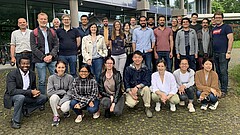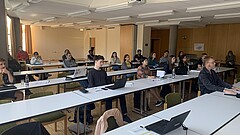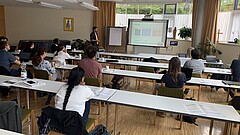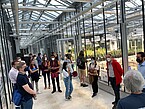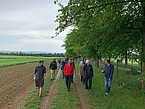Second Block Seminar of the 2nd Generation [02.06.22]
The second block seminar of the 2nd generation of IRTG AMAIZE-P doctoral researchers was held at the China Agricultural University (CAU) and the University of Hohenheim from May 23 - 28, 2022, in hybrid format.
The overall topic of the second block seminar of the 2nd generation was “Genetic Potential” and covered the topics of Subject Area (SA) 1. The scientific contents were mainly arranged by the CAU. Four high-level invited speakers from universities and research academies in the USA, China, Germany and Australia were invited to give online scientific or educational lectures.
The block seminar was opened with welcome addresses by the Chinese and the German spokespersons, live from Dali, Yunnan Province, China, and from Hohenheim, respectively. The presentations (progress reports) by the 2nd generation of Chinese and German doctoral researchers were held on 24, 25 and 27 May, 2022. No activities took place on 26 May (public holiday in Germany). The presentations focused on work in progress, including field and lab experiments initiated, and concepts for surveys as well as modelling approaches to be carried out during the coming months.
The block seminar was held remotely from office/home office at the CAU, and largely in presence in a conference hall at the Tagungszentrum Haus Birkach close to the University of Hohenheim, and connected live via an online platform. The total number of participants was 58 on the Chinese and 42 on the German side. Up to 67 online participants were simultaneously counted during presentations by the invited speakers. The sessions were recorded live via the online platform’s recording function (as back-up), and the resulting MP4 video files made available for educational purposes upon request for IRTG AMAIZE-P members only. This block seminar continued the hybrid format which had been well established during the preceding seminars.
On-site visits
As part of the second block seminar on the German side, a half-day visit to the Agricultural Research Station of the University of Hohenheim took place in the afternoon of 23 May 2022. It was organized by Research Subjects (RS) 1.1 and 1.2 of the IRTG AMAIZE-P. It started with a visit to the Phytotechnical Center, the University’s new high-tech research greenhouse. This was followed by a visit of the research station of Heidfeldhof, where many plant breeding field experiments are being carried out by RS 1.1. Thereafter, the Nutritional Crop Physiology Lab of RS 1.2 at the Institute of Crop Science (340h) was visited. The day ended with a social event at the Institute of Crop Science of the University of Hohenheim.
Educational programme
On 28 May 2022, the invited speaker Prof. emer. Dr. Hans Lambers, from the School of Biological Sciences at the University of Western Australia in Perth, Australia, gave a 2-hour online educational talk for the doctoral researchers and interested scientists on “Preparing your results for publication: Maximizing your chances to get your manuscript rapidly accepted”. His presentation was very well received.
As extra educational programme, an online workshop on “Good Scientific Practice” was held on 17 and 18 May, 2022. A total of 17 doctoral researchers participated in the two-day event; 15 were from the 2nd generation on the German side, and 2 were from the 1st generation on the Chinese side who were then staying in Hohenheim. The workshop was held by Dr. Julia Verse, an experienced consultant from the Team Scientific Integrity from the Federal Republic of Germany (see separate item). The workshop was very well received.
As additional items, an online meeting of Chinese and German Principle Investigators (PIs) and Senior Researchers was held on 25 May, 2022. An online meeting of the IRTG AMAIZE-P Advisory Board, including Chinese and German PIs, was organized on 27 May 2022. Finally, a feedback session (hybrid) with German and Chinese doctoral researchers of the 1st and 2nd generation took place on 27 May 2022. It included an evaluation sheet (for the participants on the German side) on the educational programme of the IRTG AMAIZE-P and the scientific and educational contents of all seven block seminars held since 2018.

